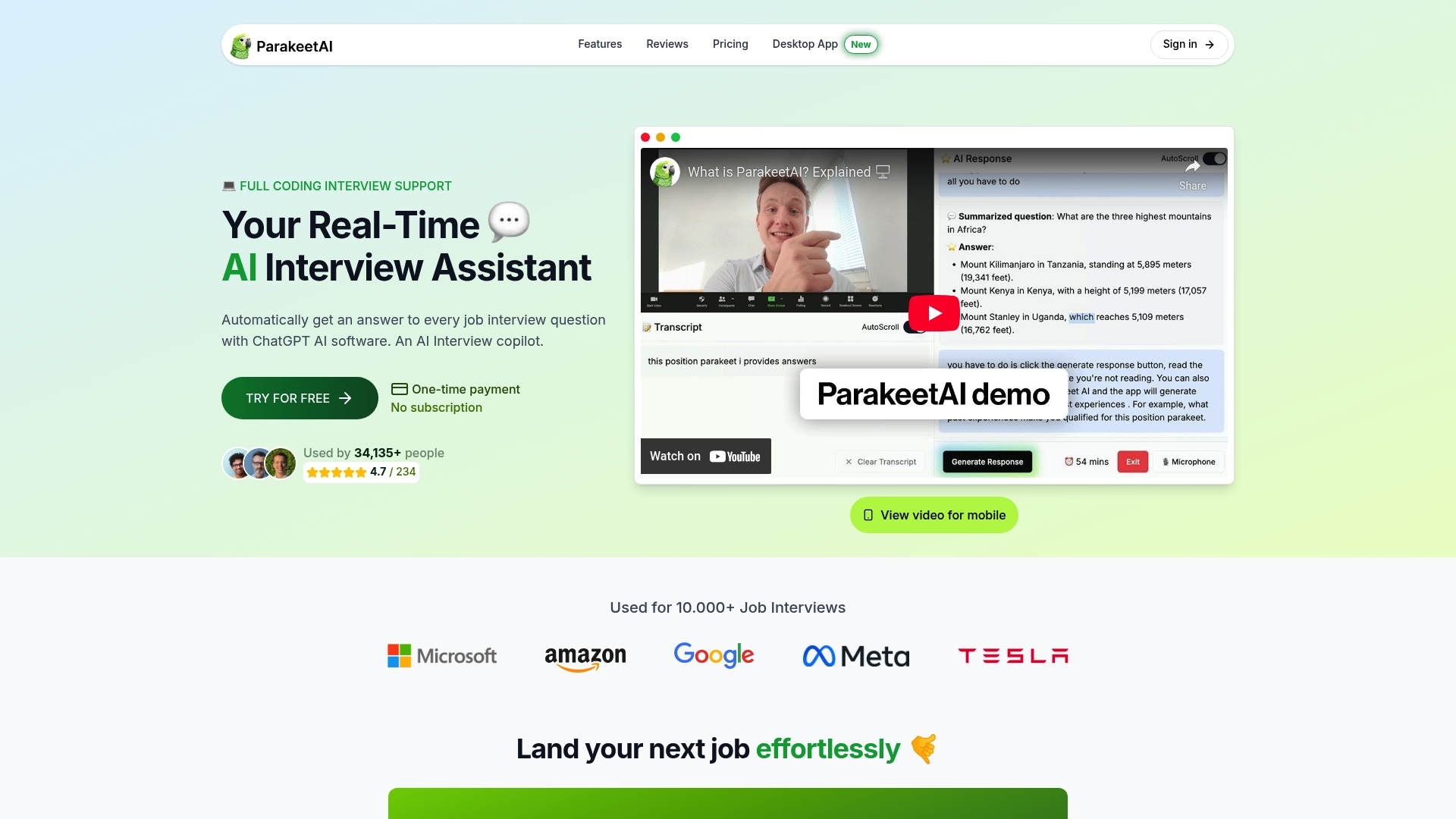Video Interview AI: Complete Guide

Nearly 75 percent of recruiters now use some form of video interview AI in their hiring process. This rapid shift is changing how companies identify talent and how candidates prepare for interviews. With advanced systems that can assess communication skills and even detect subtle emotional cues, both employers and job seekers are stepping into a new era of recruitment where artificial intelligence plays a pivotal role in decision-making.
Table of Contents
- Definition And Core Concepts
- Video Interview AI Formats Explained
- How Video Interview AI Operates
- Ethical And Legal Implications
- Benefits Versus Risks And Alternatives
Key Takeaways
| Point | Details |
|---|---|
| Transformation of Recruitment | Video Interview AI revolutionizes traditional hiring by integrating advanced machine learning for objective evaluations. |
| Diverse Interview Formats | Various AI formats, such as asynchronous and chatbot interviews, enhance flexibility and accessibility in recruitment. |
| Ethical Considerations | The use of AI in hiring poses ethical dilemmas, including bias and privacy concerns, necessitating careful governance. |
| Benefits vs. Risks | While offering scalability and reduced bias, organizations should be wary of privacy issues and the potential loss of human connection in interviews. |
Definition And Core Concepts
Video Interview AI represents an advanced technological approach that leverages artificial intelligence to transform traditional job interview processes. These sophisticated systems utilize machine learning algorithms and natural language processing to analyze verbal and non-verbal communication during interview interactions.
According to research from SimInterview, these AI systems are designed to conduct personalized, real-time conversational interviews that dynamically adapt scenarios to match individual candidate profiles. The core capabilities typically include:
- Automatic question generation based on candidate resume
- Real-time language translation capabilities
- Comprehensive candidate performance assessment
- Adaptive interview scenario modeling
Research from advanced neural network studies, such as the Hierarchical Reasoning Graph Neural Network approach, demonstrates how AI can automatically assess candidate competency by modeling intricate interactions between interview questions and answers. Key technological components include natural language understanding, sentiment analysis, and contextual interpretation algorithms that go far beyond traditional screening methods.
These AI interview technologies represent a significant leap from manual recruitment processes, enabling more objective, consistent, and data-driven candidate evaluations. By removing human bias and providing standardized assessment frameworks, video interview AI systems are transforming how organizations discover and evaluate talent in an increasingly digital workplace.
Video Interview AI Formats Explained
Video Interview AI encompasses several distinct formats that leverage artificial intelligence to transform the recruitment process. Understanding these formats helps candidates and employers navigate modern hiring technologies more effectively.
According to research from Morgan McKinley, AI interview formats can be categorized into multiple innovative approaches:
- Asynchronous Video Interviews: Candidates record responses to preset questions without real-time interaction
- AI-Transcribed Interviews: Automatic conversion and analysis of interview dialogue
- AI Chatbot Interviews: Interactive avatar-led conversational assessments
- Real-Time AI Analysis: Immediate evaluation during live video interviews
One-way interviews, a prominent subset of video interview AI, enable employers to conduct online assessments where candidates independently record responses to standardized questions. This format allows for consistent candidate evaluation, eliminating scheduling complexities and geographic limitations.
These AI-powered interview formats represent a technological evolution in recruitment, offering unprecedented scalability, objectivity, and efficiency. By integrating advanced machine learning algorithms, they provide nuanced insights into candidate communication skills, emotional intelligence, and professional potential beyond traditional screening methods.

Here’s an overview of key Video Interview AI formats and their characteristics:
| Format | Interaction Type | Key Advantages |
|---|---|---|
| Asynchronous Video | Pre-recorded responses | Flexible scheduling Standardized evaluation |
| AI-Transcribed | Automated dialogue analysis | Fast processing Robust data capture |
| AI Chatbot | Interactive avatar/conversational | Engaging experience Immediate feedback |
| Real-Time AI Analysis | Live interview with instant AI scoring | Immediate insights Dynamic adaptation |
| One-Way Interview | Candidate records answers independently | Eliminates scheduling Consistency across candidates |
How Video Interview AI Operates
Video Interview AI represents a sophisticated technological system that transforms traditional recruitment processes through advanced machine learning and computer vision techniques. By integrating multiple intelligent algorithms, these systems analyze candidate interactions with unprecedented depth and precision.
Research from Springer Open reveals that intelligent video interview agents utilize semi-supervised convolutional neural networks to predict critical candidate attributes. These networks can assess:
- Communication skills
- Personality traits
- Emotional intelligence
- Non-verbal communication signals
- Contextual response patterns
The operational mechanism involves multiple sophisticated stages. Initially, the AI system captures video and audio input, breaking down the candidate’s interview performance into granular data points. Advanced natural language processing algorithms then analyze verbal responses, examining linguistic nuances, tone, vocabulary complexity, and semantic coherence.
Simultaneously, computer vision technologies perform real-time facial and body language analysis. These systems can detect microexpressions, assess emotional states, and evaluate non-verbal communication cues that traditional interview methods might overlook. By combining these complex analytical processes, Video Interview AI provides employers with a comprehensive, objective evaluation of candidate potential beyond conventional screening techniques.
Ethical And Legal Implications
Video Interview AI introduces complex ethical challenges that demand careful consideration and proactive governance. The integration of artificial intelligence into recruitment processes raises critical questions about fairness, privacy, and potential systemic biases.
According to research from ArXiv, AI-driven video interview assessments present significant ethical concerns, particularly regarding bias amplification inherent in training data. These systems can potentially generate discriminatory outcomes based on protected attributes such as gender, ethnicity, and age, creating significant legal and moral risks for organizations.
Key ethical considerations include:
- Potential algorithmic discrimination
- Candidate privacy and data protection
- Transparency of AI decision-making processes
- Consent and informed participation
- Accuracy and fairness of automated assessments
Research from EDUCAUSE suggests that the emergence of AI interviewing technologies necessitates a fundamental shift in career preparation. Candidates must now focus on delivering genuine, meaningful responses that transcend traditional rehearsed interview techniques, understanding that AI systems are designed to evaluate deeper communication qualities and contextual understanding.
Benefits Versus Risks And Alternatives
Video Interview AI presents a complex landscape of technological innovation balanced with potential challenges. Organizations must carefully weigh the transformative potential against emerging risks to make informed implementation decisions.
According to Morgan McKinley, while AI and video technologies offer significant recruitment advantages, they simultaneously introduce critical considerations around implementation.
Benefits of Video Interview AI:
- Unprecedented scalability in candidate screening
- Objective performance assessment
- Reduced human bias in initial selection
- Consistent evaluation metrics
- Enhanced candidate accessibility
Risks and Potential Drawbacks:
- Privacy concerns with personal data collection
- Potential algorithmic bias
- Technical barriers for some candidates
- Reduced human connection in hiring process
- Potential candidate anxiety during assessments
HireVue’s experiences highlight the complex landscape, demonstrating how AI interview platforms can generate significant controversy, particularly regarding micro-expression analysis and candidate psychological impact. Alternative approaches include hybrid models that combine AI screening with traditional human evaluation, ensuring technological efficiency while maintaining essential human judgment and empathy in recruitment processes.

Elevate Your Interview Game with Real-Time AI Support
The “Video Interview AI: Complete Guide” highlights key challenges like managing anxiety, delivering authentic responses, and adapting to AI-driven evaluations that analyze communication and non-verbal cues. If you’ve felt overwhelmed by the complexity of AI interview formats such as asynchronous videos or real-time AI analysis, you are not alone. Many candidates struggle to stand out while navigating dynamic assessments that demand both technical knowledge and emotional intelligence.
Discover how Parakeet AI can transform your preparation by acting as a real-time interview assistant that listens and responds instantly to every question. This groundbreaking approach addresses the pain points of personalized question adaptation, consistent performance, and overcoming biases discussed in the article. Imagine unleashing your potential with AI-powered guidance that helps you focus on meaningful, genuine answers tailored to modern hiring expectations.

Take control of your next video interview today. Visit Parakeet AI now to experience the future of job interviews. Don’t let AI assessments catch you unprepared. Equip yourself with a smart assistant designed to boost confidence and deliver precision answers that resonate. Get started and turn the challenge of AI interviewing into your competitive advantage.
Frequently Asked Questions
What is Video Interview AI?
Video Interview AI represents an advanced technology that uses artificial intelligence to conduct job interviews, analyzing both verbal and non-verbal communication using machine learning algorithms and natural language processing.
How does Video Interview AI work?
Video Interview AI captures video and audio input during interviews and analyzes candidates’ performances through natural language processing and computer vision technologies, evaluating communication skills, emotional intelligence, and other critical attributes.
What are the different formats of Video Interview AI?
Different formats include asynchronous video interviews, AI-transcribed interviews, AI chatbot interviews, real-time AI analysis, and one-way interviews, each providing unique advantages such as flexibility and standardized evaluation.
What are the ethical considerations of using Video Interview AI?
Key ethical considerations include the potential for algorithmic discrimination, candidate privacy concerns, the transparency of AI decision-making, consent, and the accuracy and fairness of automated assessments.




